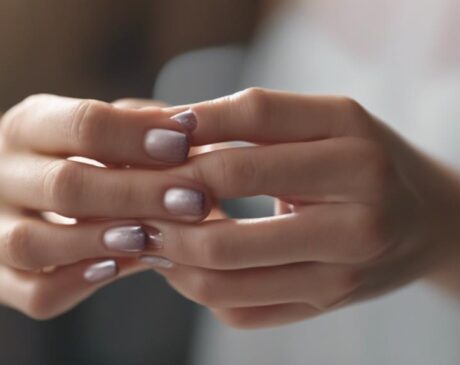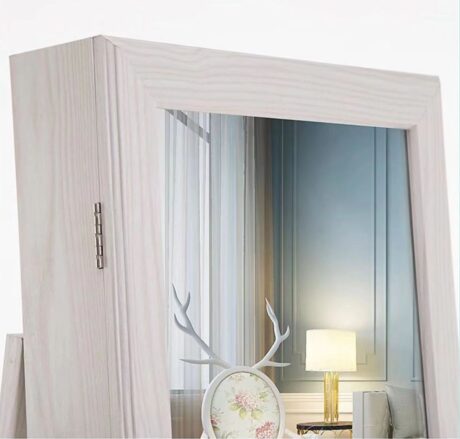What Do Salons Use for Nail Glue?
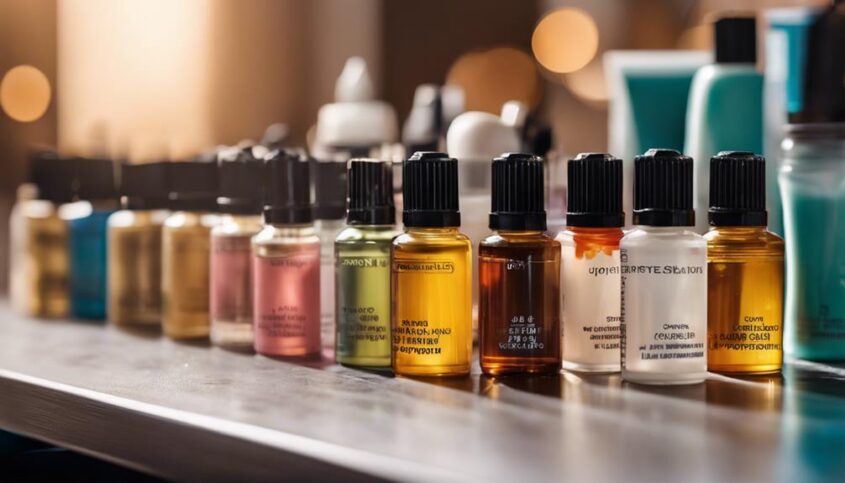
Salons commonly utilize cyanoacrylate-based nail glue renowned for its quick-drying and robust characteristics, ensuring enduring outcomes for diverse nail enhancements. This reliable adhesive option is favored for its efficiency and longevity, delivering top-quality results for clients seeking professional nail services.
Key Takeaways
- Cyanoacrylate-based nail glue for fast-drying and durable results.
- Resin-based nail glue provides flexibility and a natural feel.
- UV/LED-cured nail glue for precision and resistance to lifting.
- Brush-on nail glue allows for intricate designs and easy application.
- Various options cater to different client preferences for nail enhancement.
Types of Nail Glue Used in Salons
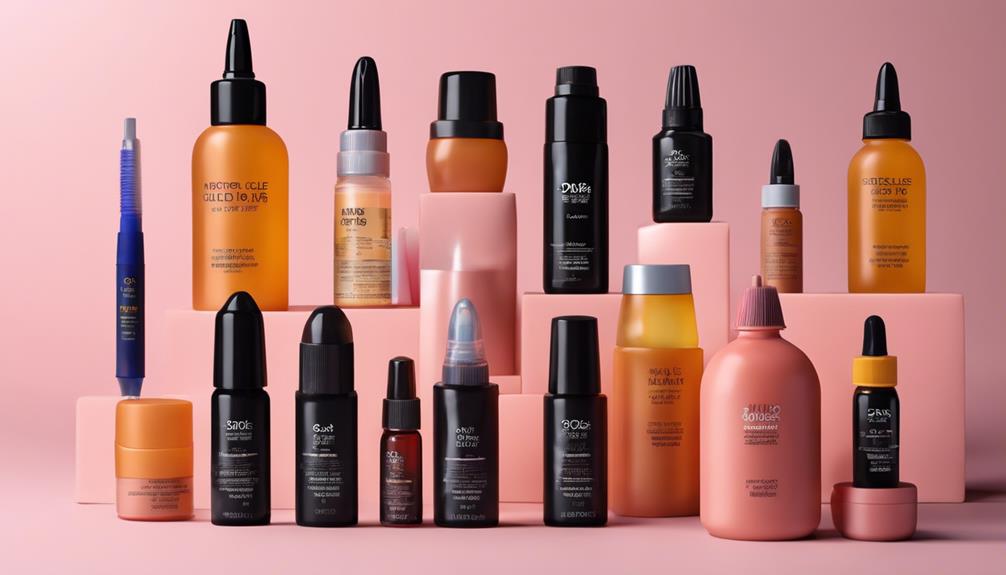
Various types of nail glue are commonly used in salons to ensure strong and long-lasting adhesion for nail enhancements. One popular type is cyanoacrylate-based nail glue, known for its fast-drying and durable properties. This type of glue is favored for its ability to create a secure bond between the natural nail and artificial enhancements, such as acrylics or gel extensions. Another common option is resin-based nail glue, which offers flexibility and resilience, ideal for clients who prefer a more natural feel. Some salons also utilize UV/LED-cured nail glue, which requires a curing lamp to harden and create a strong bond. This type of nail glue is valued for its precision and ability to resist lifting or loosening over time. Additionally, brush-on nail glue is popular for its ease of application and ability to reach tight spaces for intricate nail designs. With a variety of options available, salons can cater to different client preferences and nail enhancement needs, ensuring a high-quality and innovative service.
Ingredients in Salon Nail Glue
When it comes to salon nail glue, understanding the composition and ingredients used is crucial for both nail technicians and clients. The insights into the ingredients can shed light on the adhesive properties and durability of the glue. This knowledge can enhance the application process and ensure long-lasting results for beautiful nails.
Nail Glue Composition
Salon nail glue typically comprises a precise formulation of key ingredients essential for strong and long-lasting nail adhesion. These formulations often include ethyl cyanoacrylate, a fast-acting adhesive that creates a secure bond between the natural nail and the artificial extension. Additionally, some nail glues contain additives like hydroquinone to regulate the curing process, ensuring optimal drying time for the glue to set correctly. Other ingredients such as butyl acetate may be included to enhance flexibility and durability, preventing the nail from easily breaking or chipping. By carefully selecting and combining these components, salon nail glue manufacturers strive to deliver a product that meets the high standards of both professionals and clients seeking innovative nail enhancement solutions.
Application Process Insights
In understanding the application process of salon nail glue, it is imperative to consider the composition of key ingredients that play a vital role in ensuring a strong and durable bond between natural and artificial nails. These ingredients include:
- Cyanoacrylate: Provides rapid adhesion for quick salon appointments.
- Ethyl Cyanoacrylate: Enhances flexibility for natural nail movement.
- Hydroquinone: Prevents premature curing for precise application.
- Tetrahydrofurfuryl Methacrylate: Increases the glue's durability for long-lasting wear.
These innovative components work synergistically to deliver not only efficient application but also a reliable and aesthetically pleasing result, meeting the high standards expected in professional salon settings.
How Nail Glue Works
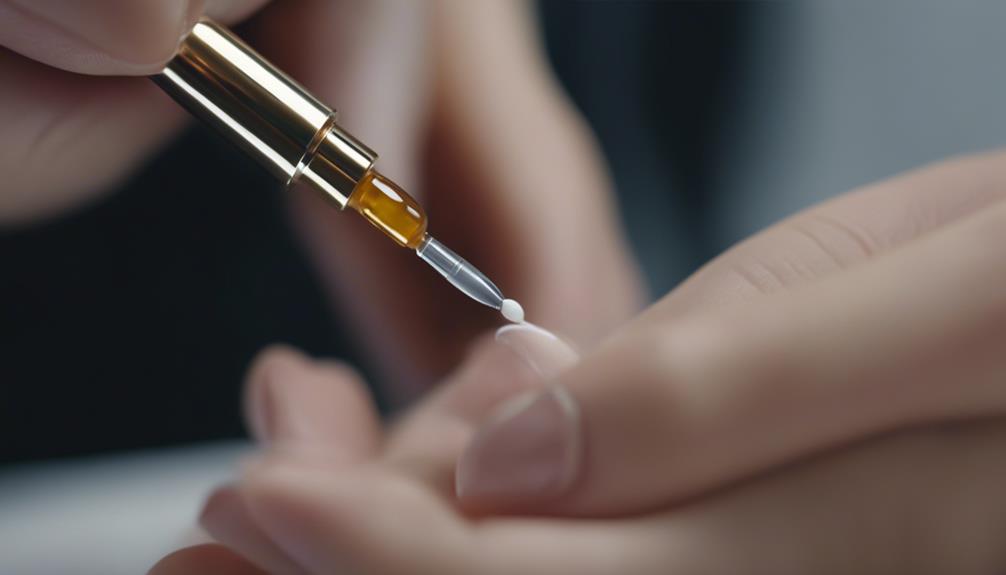
Nail glue works by creating a strong bond between the artificial nail and the natural nail bed. Its composition includes cyanoacrylate, which polymerizes upon contact with the air, forming a durable adhesive. When applying nail glue, it is crucial to follow safety precautions to prevent skin irritation or accidental bonding.
Nail Glue Composition
Composed of a specialized adhesive formula, nail glue functions by creating a strong bond between the artificial nail and the natural nail surface. This adhesive composition is designed to ensure long-lasting adhesion and durability, providing a reliable hold for various nail enhancements. The innovative nature of nail glue lies in its ability to offer both flexibility and strength, catering to the diverse needs of nail art enthusiasts. Embrace the power of technology with nail glue formulations that prioritize ease of application and quick drying times, revolutionizing the nail enhancement experience. Elevate your nail game with these cutting-edge features:
- Quick-drying formula for efficient application
- Enhanced flexibility to prevent cracking or lifting
- High-strength adhesive for long-lasting wear
- Innovative packaging designs for precision application
Application Techniques
The proper application techniques of nail glue are essential for ensuring a secure and long-lasting bond between artificial and natural nails. When applying nail glue, start by gently pushing back the cuticles and cleaning the nail surface to remove any oils or residue. Apply a small amount of glue to the artificial nail, avoiding contact with the skin. Press the artificial nail firmly onto the natural nail and hold in place for a few seconds to allow the glue to set. For added strength, consider applying an additional layer of glue along the edges of the artificial nail. Remember, less is more when it comes to nail glue – using too much can lead to a messy application and potentially weaken the bond.
Safety Precautions
It is imperative to understand the chemical composition and bonding mechanism of nail glue to ensure safe and effective application. Nail glue typically consists of cyanoacrylate, which creates a strong bond when it comes into contact with moisture. To ensure safety and optimal results, consider the following precautions:
- Prioritize ventilation to avoid inhaling fumes.
- Use in a well-lit area to prevent eye irritation.
- Avoid skin contact to prevent potential allergic reactions.
- Store in a cool, dry place away from heat sources.
Best Practices for Nail Glue Application
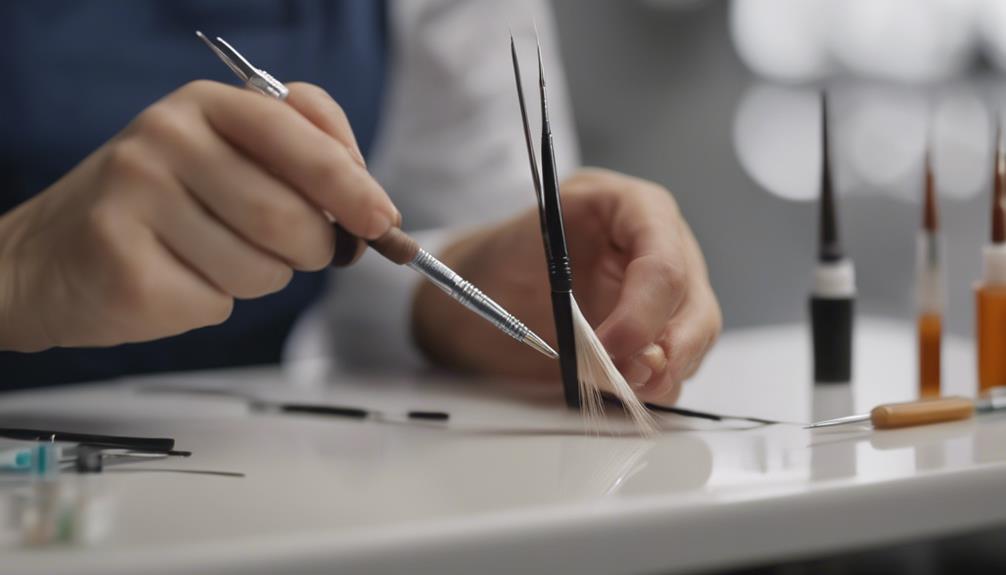
Implementing proper technique when applying nail glue is essential for achieving long-lasting and secure results. To begin, ensure that the nail plate is clean and dry before starting the application process. This step is crucial as any oil or moisture on the nail surface can hinder the adhesion of the glue. Next, apply a small amount of glue directly onto the natural nail, avoiding contact with the skin. It is recommended to use a thin layer to prevent excess glue from seeping out when pressing the artificial nail onto the natural nail. When attaching the artificial nail, press down firmly and hold in place for a few seconds to allow the glue to set properly. To enhance the longevity of the manicure, seal the edges of the artificial nail with additional glue to prevent lifting. Finally, advise clients to avoid exposing their nails to excessive water or harsh chemicals immediately after application to maintain the integrity of the bond. By following these best practices, nail technicians can deliver impeccable and durable nail enhancements that meet the expectations of their clients.
Removing Nail Glue Safely
When addressing the removal of nail glue, employing gentle yet effective techniques is paramount to safeguarding the health and integrity of the natural nail. It is crucial to prioritize methods that ensure the nail remains undamaged while effectively eliminating the adhesive. Here are some innovative approaches to safely remove nail glue:
- Oil Soak: Gently soaking the nails in warm oil helps to loosen the glue without causing harm.
- Buffing Technique: Utilizing a gentle buffing block can aid in removing the glue residue without excessive force.
- Acetone Solution: Applying acetone to a cotton ball and carefully swabbing the affected area can dissolve the glue effectively.
- Professional Removal Kits: Investing in specialized nail glue removal kits can provide a safe and efficient way to eliminate stubborn residues.
Nail Glue Allergies and Sensitivities
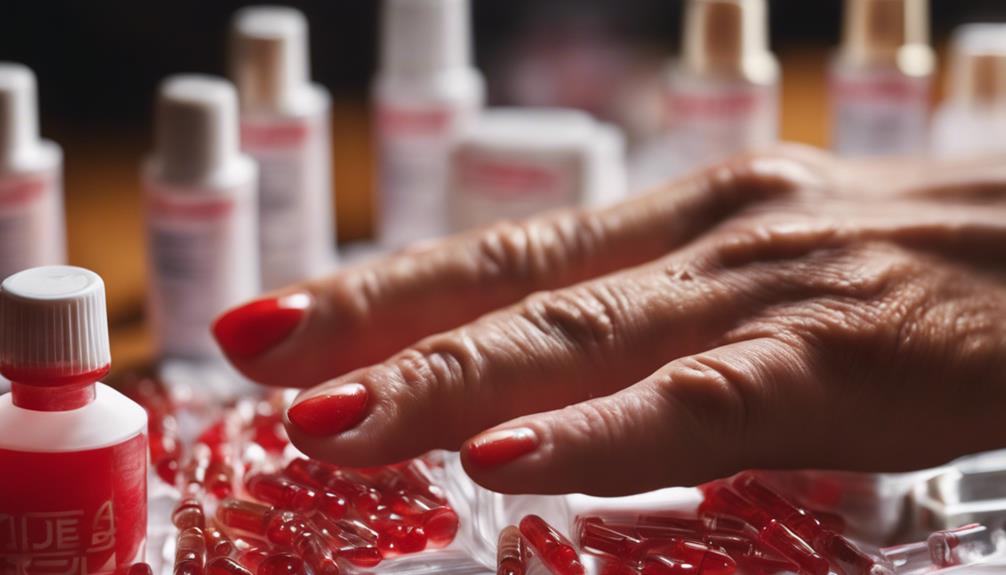
An awareness of potential allergic reactions and sensitivities related to nail glue is crucial in maintaining the safety and well-being of individuals undergoing nail treatments. Nail glue typically contains ingredients like ethyl cyanoacrylate, which can trigger allergic reactions in some people. Symptoms of nail glue allergies or sensitivities may include redness, itching, swelling, or even blistering around the nail area. In severe cases, individuals may experience difficulty breathing or a rash spreading beyond the nails. It is essential for nail technicians to inquire about any known allergies or sensitivities before applying nail glue to avoid adverse reactions. Additionally, individuals with a history of allergies may consider opting for hypoallergenic nail glue formulations or undergoing patch tests prior to a full application. Innovation in nail glue formulations continues to evolve, with some brands offering low-odor, low-irritant options that cater to individuals with sensitivities. Staying informed about the potential risks and advancements in nail glue technology can help ensure a safe and comfortable nail treatment experience.
Alternatives to Salon Nail Glue
Consider exploring alternative adhesive options for nail treatments in salons to cater to individuals with sensitivities or preferences beyond traditional nail glue formulations. As the demand for innovative solutions grows, salons can offer a range of alternatives that provide both effective adhesion and a hypoallergenic option for those with sensitivities. Here are some cutting-edge alternatives to traditional salon nail glue formulations:
- Bio-based Adhesives: Embrace eco-friendly options derived from natural ingredients to appeal to environmentally conscious clients.
- UV Gel Nail Extensions: Offer long-lasting and durable nail extensions that are cured under UV light, providing a strong bond without the use of traditional nail glue.
- Nail Wraps: Introduce trendy nail wrap options that require no drying time and are easy to apply, catering to clients looking for quick and hassle-free nail treatments.
- Dual-sided Adhesive Tabs: Provide a convenient and temporary solution for nail enhancements without the need for traditional liquid adhesives, appealing to those seeking versatility in their nail treatments.
Frequently Asked Questions
Can Nail Glue Be Used on All Types of Nails, Including Acrylic, Gel, and Natural Nails?
When it comes to using nail glue, it's essential to consider the type of nails involved. Nail glue can typically be used on various nail types, including acrylic, gel, and natural nails, but always check product instructions for compatibility.
Is There a Difference Between the Nail Glue Used in Salons and the Nail Glue Available for Purchase in Stores?
There is a distinction between nail glue used in salons and store-bought versions. Salon-grade nail glue often contains stronger adhesives for professional use and longevity. It may also have additional ingredients for improved bond strength and durability compared to consumer-grade alternatives.
Are There Any Special Precautions or Recommendations for Pregnant Women Using Nail Glue in Salons?
Pregnant women using nail glue in salons should prioritize well-ventilated spaces to minimize exposure to fumes. Towards innovation, nail technicians can explore non-toxic, pregnancy-safe glue options. Prioritizing safety and health is crucial during this delicate period.
How Long Does Salon Nail Glue Typically Last Before Needing to Be Reapplied?
Salon nail glue typically lasts for 1-2 weeks before needing reapplication. Factors such as daily activities, nail care routine, and the quality of the glue can influence its longevity. Regular maintenance and touch-ups can help extend the lifespan of the nail glue.
Can Salon Nail Glue Be Used to Repair Broken or Damaged Nails, or Is It Solely for Application of Artificial Nails?
Salon nail glue can be used not only for applying artificial nails but also for repairing broken or damaged nails. Its strong adhesive properties make it suitable for various nail enhancement techniques, providing durability and resilience.



